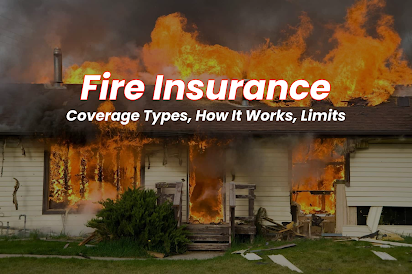Fire Insurance: Coverage Types, How It Works, Limits
Fire insurance is a type of property insurance
that provides coverage for losses and damages caused by fire. It is designed to
protect homeowners, renters, and business owners against financial losses due
to fire damage to their property.
Looking for fire insurance coverage in
Pakistan? Learn about coverage types, how it works, and limits with United
Insurance Company of Pakistan Limited. Protect your property and financial
security with our comprehensive fire insurance policies. Get a quote today!
Now we will discuss the coverage types, how it
works, and their limits.
Coverage Types:
Fire insurance policies typically cover the following types of losses and damages caused by fire:
- Property Damage: Fire insurance covers the cost of repairing or replacing damaged property, including buildings, furniture, fixtures, and personal belongings.
- Business Interruption: If a business suffers a loss due to fire, fire insurance may cover the lost income and expenses during the period of interruption.
- Liability: If a fire causes injury to a person or damage to their property, fire insurance may cover the costs of legal defense and damages awarded in a lawsuit.
How It Works:
Fire insurance policies are typically issued on
a named-peril basis, which means they cover only the perils specifically listed
in the policy. The policyholder pays a premium to the insurance company, which
agrees to pay for any losses covered by the policy.
If a fire occurs, the policyholder must file a
claim with the insurance company. The claim must include a detailed description
of the damage, including the cause of the fire, the date and time it occurred,
and the estimated cost of repairs or replacement.
Once the claim is filed, the insurance company
will send an adjuster to inspect the damage and determine the amount of the
loss. The adjuster will work with the policyholder to determine the appropriate
amount of compensation based on the terms of the policy.
Limits:
Fire insurance policies typically have limits
on the amount of coverage provided for each type of loss. These limits may be
based on the value of the property, the type of property, or the policyholder's
risk profile.
It is important for policyholders to understand
the limits of their fire insurance policy and to make sure they have adequate
coverage for their needs. If the cost of repairing or replacing damaged
property exceeds the policy limits, the policyholder may be responsible for
paying the difference out of pocket.
In addition, fire insurance policies may
include deductibles, which are the amounts the policyholder must pay out of
pocket before the insurance company will pay for any losses. Higher deductibles
can lower the cost of the policy but may increase the financial burden on the
policyholder in the event of a loss.
Conclusion:
Fire insurance is an essential type of
insurance coverage for homeowners, renters, and business owners. It protects
against the financial losses caused by fire damage to property and can help to
ensure that policyholders can recover from unexpected losses.
Policyholders should review their fire
insurance policy carefully and make sure they understand the coverage types,
how it works, and its limits. They should also make sure they have adequate
coverage for their needs and consider adjusting their coverage or deductibles
if their circumstances change.




Comments
Post a Comment